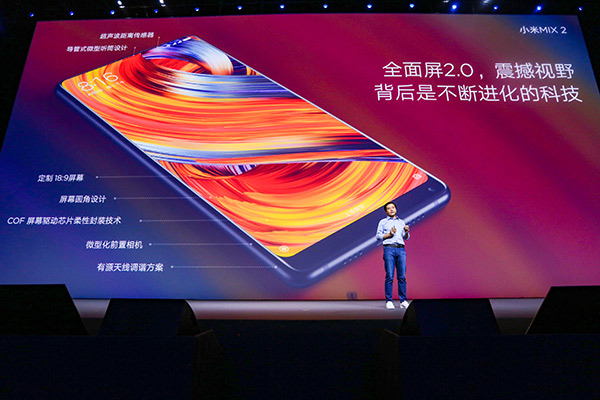 |
|
Lei Jun, founder of smartphone maker Xiaomi, presents an updated version of the company's "concept smartphone" Mi Mix, the Mi Mix 2, in Beijing on Sept 11, 2017.[Photo provided to chinadaily.com.cn] |
BATX have no respect for boundaries: sectors, countries, and technologies. While BATX' roots are in search technology, ecommerce, social communication and software, the times have changed in the last 5 years or so. These new technology giants are active in over 20 different sectors, both online and offline and increasingly in hardware electronics. Alibaba and Tencent have penetrated almost every aspect of the life of a Chinese consumer. Xiaomi is one of the largest players in smart homes, Internet of Things and smart wearables. While Google and Facebook's revenue models are predominantly based on advertisement, BATX have diverse sources of income, related to their wide variety of activities.
Global presence is no longer just an ambition but already becoming a reality. BATX gained hundreds of millions of users in international markets, footholds in American, European and Asian markets, over 150 direct overseas investments and acquisitions and rapidly spreading pioneering payment, cloud and communication technology services. In fact, BATX reported in 2015 that about 10 percent of their total revenues – considering their huge revenues, this totals billions of dollars – already came from abroad. As oversized startups, still in the early phases of developing mature management systems, these companies have internationalized early and rapidly. Although these are the first experiments and they may go wrong, BATX will not rest until succeeding abroad.
Did you know that BAT are consistently on MIT Technology Review's list of smartest companies in the world? While Chinese companies were long hailed as copycats, this has now become a bad joke. In fact, BATX not only improved their core technologies such as search algorithms and communication tools, but also developed innovations outside their core technology, such as AI, social media, online security and mobile payment. Alibaba and Tencent's advances in mobile technology, from payment to communication, are world leading. Baidu's driverless car ambition beats Tesla with first commercial cars on the road in 2019. Xiaomi's massive Internet of Things network with over 300 million connected devices deployed makes many traditional appliance and electronics manufacturer jealous. But perhaps it is the embrace of multiple, pioneering technologies that sets BATX apart.
But does this mean that these boundaryless organizations have nothing to keep them together? Our decade-long research as summarized in our book Business ecosystems in China: Alibaba and peers Baidu, Tencent, Xiaomi and LeEco (Routledge, 2017), suggests otherwise. In fact, no longer can Chinese companies rely on cost advantages but are required to innovate their whole business. And this is indeed what BATX have done by creating business ecosystems, rather than corporations.
Business ecosystems are boundaryless organizations of interdependent businesses with customer centric offerings across industries. Our research shows that Chinese business ecosystems are digital driven, featured with strong interdependence between the businesses and orchestration by a focal player, innovate across the boundaries of industries and countries and co evolve with the dynamic business environment. Chinese business ecosystems developed and transformed from organic growth to rapid expansion by investment, incubation, innovation and internationalization. For example, each of them invested in over 40 companies on average for the last 5 years and hundreds of new CEOs have been groomed inside the business ecosystems. For instance, the founder of the world’s second-largest unicorn Didi Chuxing – right after Uber – is former Alibaba salesman Cheng Wei, NASDAQ listed Xunlei (XNET) is founded by a former Baidu engineer Cheng Hao.
GAFA needs to be aware of BATX's boundaryless business approach, leveraging a new way of organizing and exploiting the benefits of both strategic planning and entrepreneurial decision making. BATX's business ecosystems are leading, creating and disrupting markets, not only in China, but in the rest of the world as well.
Mark J. Greeven is a Chinese-speaking Dutch Professor of Innovation and Entrepreneurship at Zhejiang University, China and non-resident research fellow at the Center for China and Globalization. He is on the 2017 Thinkers50 Radar list of 30 next generation business gurus.
Wei Wei is an entrepreneur, investment professional, and the founder of GSL (www.gslpartner.com), an innovation management consultancy. She received bachelor and master degrees in engineering from Tsinghua University and master degree from RWTH Aachen University.